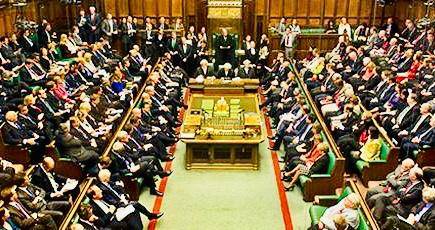LONDON: No luxury cars come to pick or drop the British members of the parliament when they are at work.
The parliamentarians can be seen coming out of the main gate walking and looking for a bus or train to get back home.
The people also do not give them any superstar status and take the parliament as a place of work where ‘more responsible’ people discuss the national issues.
“For years we have seen the MPs going back and coming to work on trains and buses. They don’t try to impose themselves as super beings,” a security official at the parliament’s main gate told The Nation.
An official at the parliament said the MPs preferred trains and buses for greener environment.
“We discourage cars in the main city. It pollutes environment. Most people have started using trains and buses to about parking fee and the lack of parking space. The trains and buses take you to the destination faster than cars,” he said, citing the traffic jams at the peak hours.
He said the MPs, especially the members of the House of Commons traditionally adopt simplicity - in sharp contrast their Pakistani counterparts.
“The MPs don’t behave like superiors. They work just like any other citizen. In fact they work more and they move around like common citizens,” he maintained.
The parliament of the United Kingdom is the supreme legislative body of the country, the Crown dependencies and the British Overseas Territories.
It alone possesses legislative supremacy and thereby ultimate power over all other political bodies in the UK and the overseas territories.
The parliament is bicameral but has three parts, consisting of the Sovereign - the Queen-in-Parliament, the House of Lords, and the House of Commons - the primary chamber.
The two houses meet in the Palace of Westminster in the City of Westminster, one of the inner boroughs of the capital city, London.
The House of Lords includes two different types of members: the Lords Spiritual, consisting of the most senior bishops of the Church of England, and the Lords Temporal, consisting mainly of life peers, appointed by the Sovereign on the advice of the Prime Minister, and of 92 hereditary peers, sitting either by virtue of holding a royal office, or by being elected by their fellow hereditary peers. Prior to the opening of the Supreme Court in October 2009, the House of Lords also performed a judicial role through the Law Lords.
The House of Commons is an elected chamber with elections to 650 single member constituencies held at least every five years under the first-past-the-post system.
The two Houses meet in separate chambers in the Palace of Westminster - commonly nown as the Houses of Parliament in London.
By constitutional convention, all government ministers, including the Prime Minister, are members of the House of Commons or, less commonly, the House of Lords and are thereby accountable to the respective branches of the legislature. Most cabinet ministers are from the Commons, whilst junior ministers can be from either House. However, the Leader of the House of Lords must be a peer.
In theory, the UK's supreme legislative power is officially vested in the Crown-in-Parliament. However, the Crown normally acts on the advice of the Prime Minister and the powers of the House of Lords are limited to only delaying legislation; thus power is de facto vested in the House of Commons.
The supremacy of the British House of Commons was reaffirmed in the early 20th century. In 1909, the Commons passed the so-called "People's Budget", which made numerous changes to the taxation system which were detrimental to wealthy landowners.






